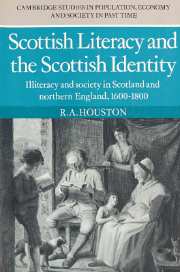 Scottish Literacy and the Scottish Identity
Scottish Literacy and the Scottish Identity Book contents
- Frontmatter
- Contents
- Tables
- Abbreviations
- Preface
- 1 The ideal of Scottish literacy
- 2 Structures and trends in illiteracy in the seventeenth and eighteenth centuries
- 3 Illiteracy in mid seventeenth-century Britain
- 4 The reasons for literacy
- 5 Measures of literacy
- 6 Oral culture and literate culture
- 7 The politics of literacy
- 8 Literacy and the Scottish identity
- Appendices
- Bibligraphy
- Index
5 - Measures of literacy
Published online by Cambridge University Press: 11 November 2009
- Frontmatter
- Contents
- Tables
- Abbreviations
- Preface
- 1 The ideal of Scottish literacy
- 2 Structures and trends in illiteracy in the seventeenth and eighteenth centuries
- 3 Illiteracy in mid seventeenth-century Britain
- 4 The reasons for literacy
- 5 Measures of literacy
- 6 Oral culture and literate culture
- 7 The politics of literacy
- 8 Literacy and the Scottish identity
- Appendices
- Bibligraphy
- Index
Summary
So far, we have measured literacy by the number of people who could sign their name to a document. Most historians accept this criterion, but there is still a vigorous debate about what exactly it tells us about reading and writing as a whole. Authorities are also divided about the way in which we should understand the concept of literacy. Yves Castan argues for eighteenth–century Languedoc that sign–literacy does not mean anything apart from a desire for social prestige or a simple business requirement, and should not be used as an indicator of the presence or absence of cultural possibilities. The Swedish historian Egil Johansson, meanwhile, believes that the notion of 'universal literacy' should mean that most of the population can read and compose, but not write, their own language. For eighteenth–century England, Victor Neuburg suggests 'the ability to read a book or single sheet printed in English'. Indeed definitions which attempt to find meaningful indicators of literacy are almost as numerous as there are studies of the subject.
However, in order to compare Scotland with other parts of Europe we need a reliable criterion of literacy, a standard and direct measure which is available in all countries over the seventeenth and eighteenth centuries. To a limited extent we shall consider the difficult problem 'What is literacy?' However, the significance of reading and writing is dealt with more fully in chapter 6 and chapter 7, which cover the uses of literacy and education for the individual and society.
- Type
- Chapter
- Information
- Scottish Literacy and the Scottish IdentityIlliteracy and Society in Scotland and Northern England, 1600–1800, pp. 162 - 192Publisher: Cambridge University PressPrint publication year: 1985
- 1
- Cited by
